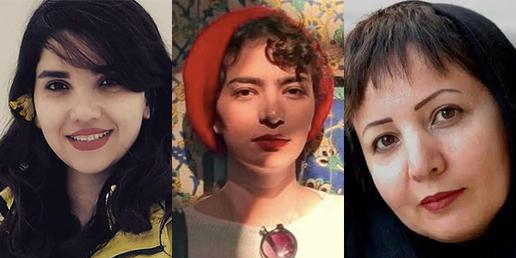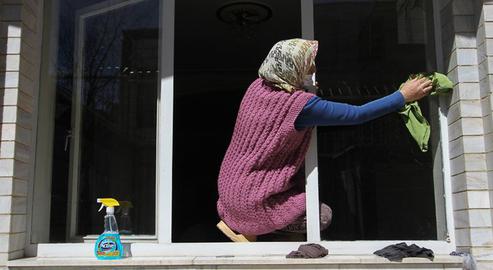Iranian authorities are cracking down on dissenting voices, and have arrested three people over a one-week period.
On October 4, security forces arrested Shabnam Ashouri, the editor-in-chief for Aghahinameh, an economic publication focusing on manual and industrial labor and workers’ rights. No reason was given for her arrest, but Reporters Without Borders has reported that at least six workers’ rights activists had also been recently arrested.
Then, on October 11, Alieh Motalebzadeh, a photojournalist, the deputy chair for the Defending Freedom of Press Association and a women's rights activist, was summoned and sent back to prison to finish serving a three-year sentence on charges of “conspiring against national security.” On the same day, citizen journalist and online activist Roghieh Nafari was also returned to prison to serve a three-month sentence for “anti-government propaganda” following comments she posted on Twitter in 2019. Both had been out on bail and both were sent to Evin Prison.
Reporters Without Borders condemned the arrest of the three citizens on October 14 and demanded their release.
The fresh crackdown on journalists and online activists comes at a time when there has been much alarm over the spread of coronavirus in Iranian prisons, made worse by poor hygiene standards on the wards.
Shabnam Ashouri
Two weeks after Shabnam Ashouri’s arrest, there is scant information about her case, including who the arresting authorities were, the reason for her detention and her whereabouts. According to reports published on the day of her arrest, officers first searched her home, where they confiscated some of her personal belongings.
The latest issue of Shabnam Ashouri’s magazine Aghahinameh featured an interview with Alireza Saghafi, a member of the Writers' Association of Iran and a labor activist, who discussed various problems the Iranian people currently face.
Alieh Motalebzadeh and Roghieh Nafari
Alieh Motalebzadeh and Roghieh Nafari were both summoned separately to appear before “enforcement officers” on October 11 and then sent to Evin Prison to serve their sentences.
In addition to working as a photojournalist for Women magazine, Motalebzadeh joined the One Million Signatures Campaign, which advocates the scrapping of laws that discriminate against women, and worked on the Campaign to Support Victims of Acid Attacks. She also made a film about the acid attacks, entitled Do Not Forget Women Victims of Violence in Society.
Some of Motalebzadeh’s photographs, such as coverage of the 1999 attack on the university dormitory in Tehran or photos of Nasrin Sotoudeh in handcuffs hugging her husband in front of the Bar Association building, have received a great deal of attention.
Motalebzadeh was arrested by Ministry of Intelligence agents on November 26, 2016 and transferred to Evin Prison. After 27 days of interrogation, she was released on bail. In autumn 2017, she was sentenced to three years in prison by Branch 26 of the Revolutionary Court on charges of "gathering and colluding against national security" and "propaganda against the regime." The sentence was upheld two years later, on October 14, 2019 by Branch 36 of the Revolutionary Court. According to Iran’s Islamic Penal Code, two of these years are enforceable. Prior to her recent arrest, she was out on bail.
Roghieh Nafari, a mathematics student at Khajeh Nasir al-Din Tusi University, was arrested on April 27, 2019 for posts she made on Twitter that criticized Iranian authorities, which she posted using the pseudonym Ashraf Molotov. She was released on May 4, 2019 on bail. She was later tried on charges of "propaganda against the regime" at Branch 26 of the Revolutionary Court of Tehran, presided over by Judge Iman Afshari, and sentenced to four months in prison. The sentence was commuted to three months in prison on appeal.
Iranian Authorities’ Well-Worn Habit of Denying They Target Dissidents
Islamic Republic authorities continue to deny that they detain or punish people for expressing their views or speaking to foreign media. A few key statements on the matter serve as the foundation for the denials that continue to this day.
In a speech in Mashhad on March 21, 2018 to mark the Iranian new year, Iran’s Supreme Leader Ali Khamenei spoke of the freedom of the Iranian people, claiming: "No one will be persecuted because he or she disagrees with the government." He also said: "Anyone who makes such a claim is a liar; no one will object to them” and: "There is freedom of thought, freedom of speech and freedom of choice" in Iran. Khamenei said those who talk about detentions and injustices were "unfair" and he accused them of "using the freedom that exists in the country to say there is no freedom in the country."
Years before the Supreme Leader's claim, Iranian foreign minister Mohammad Javad Zarif was interviewed by the US television presenter Charlie Rose on April 29, 2015. "We do not imprison anyone in Iran because of his or her beliefs,” he said on the Public Broadcasting Service (PBS) program. He then said: "People who commit crimes or violate the laws of the country cannot hide behind being journalists or political activists.”
Even before this, on September 26, 2014, President Rouhani was interviewed by US journalist Christiane Amanpour. When she asked him about Jason Rezaian, an Iranian-American journalist held in an Iranian jail at the time, he said, "You see, I really don't believe the fact at all. I do not believe that an individual would be detained or put in prison for being a journalist. An individual can be a reporter, a journalist, and have committed a crime. But that crime is not necessarily always related to their profession.”
In fact, one of Hassan Rouhani's 10 election promises during the 2013 presidential election was the implementation of a "Charter of Citizenship Rights,” which was eventually published on December 15, 2016. The charter, some jurists and commentators say, is simply a repetition of the text of Iran’s constitution and other already-enshrined laws. However, even the implementation of this duplicate charter has been forgotten amid the detention of hundreds of citizens in a series of protests, sanctions, and economic poverty. Today, it has become one of at least a hundred bitter, painful jokes circulating about Rouhani’s administration.
There are numerous examples of how untrue Khamenei’s, Rouhani's and Zarif’s statements are, both before and after they made them. One recent example is the harsh treatment of 14 activists who wrote a letter calling for the Supreme Leader’s resignation, which was published in the summer of 2019. The signatories who put their names to the bold statement were arrested and given long prison sentences.
Throughout all these years, citizens detained for expressing their opinions, their writing, or civil society activism have been tried in Revolutionary Courts and accused of jeopardizing national security, although under Iranian law charges of political crimes must be investigated and tried in a court in front of a jury.
The day after Alieh Matlabzadeh and Roghieh Nafari were transferred to prison to serve their sentences, the trial of Alireza Zakani, a member of parliament for Qom, began. It was the first jury trial for a “political crime.” The right to a trial by jury appeared to have been extended to a politician, but not to ordinary citizens. On October 12, the Association for the Defense of Freedom of the Press labeled the trial a sham, issuing a statement calling for a re-examination of Alieh Motalebzadeh's case as a political crime.
"According to the current laws of the country, including Article 168 of the Constitution, Ms. Motalebzadeh's charges should have been tried as political crimes in the presence of a jury, rather than in special security court branches," the statement, issued after the Zakani trial, read. "It is strange that just at the time of his imprisonment, the judiciary, in an attempt to enforce Article 168 — suspended until this day — held the trial of a well-known member of parliament from a particular faction as the first person accused of a political crime, in the presence of a jury. He was acquitted of the accusations against him, which had been based on a Ministry of Intelligence complaint."
visit the accountability section
In this section of Iran Wire, you can contact the officials and launch your campaign for various problems

























comments